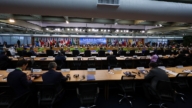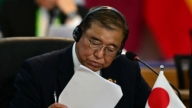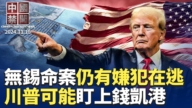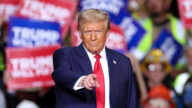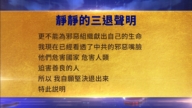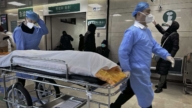【新唐人2012年5月23日訊】溫家寶日前在湖北考察時強調:要根據經濟運行中出現的新情況和問題,加強改善宏觀調控,擴大內需,穩定外需,促進經濟平穩較快發展。4月份,中國工業增加值、進出口、固定資產投資和銀行新增貸款增長都出現放緩,中共政府採取了多項措施刺激經濟,圍繞中國經濟減速的擔憂也有所加劇。
大陸經濟學者綦彥臣表示,近年來,中國的工資水平不是上漲,而是逐步下降。中國的經濟總體下行,大家都有崩潰的預期。
大陸經濟學者綦彥臣:「溫總理提振內需的說法有益,但沒有實行的可能性,現在好多銀行放不出貸款去,現在大家都不想借貸,企業方面的投資願望小了,當然就業就萎縮,就業萎縮工資他就沒有那麼多,居民收入就會很大幅度下降,就沒法走到提振內需這方面來。」
綦彥臣還表示,由於銀行利率太高,增加了產品的成本,另外,企業投資的風險可能因為經濟下行而增大,所以企業不願意再投資,大家反而不願意貸款。
大陸經濟學者綦彥臣:「第三點,稅收還是不降,而且隨著經濟緊縮,各種稅收額外的負擔對企業還越來越多,甚至維穩也在收費,所以說企業就覺得擴大再生產不合算,所以就出現了不願貸錢的這麼一種極端情況。」
經濟評論專家傑森認為,溫家寶剩幾個月就下臺了,還能做甚麼呢﹖他提出「把穩增長放在更重要位置」的說法,充其量只是個建設性的意見,希望下一屆的領導人能聽一聽。
經濟評論專家傑森:「中國的內需問題,也不是他執行一個政策就能解決的。中國目前嚴重的貧富兩極分化,這是造成內需不足的根本原因。另外,房地產對於老百姓資金的占有,還有整個中國不完善的社會保障體系,使得老百姓有錢也不敢花。醫療、養老、教育等等這些問題,不是他說就能做到的,況且他也沒有時間去系統的改變中國目前的養老體制、醫療體制,使老百姓敢花錢。」
美國「喬治梅森大學」客座教授章天亮也指出,如果靠政府投資的話,政府投資的那些產業如果沒有人消費,將來不賺錢,最後變成銀行壞帳。
美國「喬治梅森大學」客座教授章天亮:「所以中國的經濟問題,雖然說是經濟問題,但其實是政治問題,所以溫家寶他想解決國內消費的話,首先得保證社會公平的分配機制,所以溫家寶談國內消費的增加,也是為推他的政治體制上的變革,從經濟領域方面做一些推動。」
章天亮表示,中國每年的GDP中,靠國內消費拉動的百分比逐年降低,2003年還有百分之50幾,現在的話,降到百分之35左右,他認為,這說明中國的社會問題現在非常嚴重,貧富差距非常大。
美國「喬治梅森大學」客座教授章天亮:「對於胡溫來講,現在已經沒有退路了,那不把經濟搞好,將來就得負責任,這個政權也會出現問題,包括接著習近平和李克強他們也不願意接受一個經濟上的爛攤子,其實現在各方,不管是胡溫他們想為自己退休以後的安全考慮,還是習近平、李克強為自己接班之後的權力考慮,他們都得必須要在政治上作變革。」
章天亮說,除非胡溫準備跟周永康一塊兒等著被老百姓清算,否則,他們一定會有動作。
採訪/ 梁欣 編輯/周平 後製/仲元
China’s Economy Problem: An Issue of Politics?
China’s Premier Wen Jiabao stressed recently during his trip
to Hubei Province a few points on economic development.
They include, improve macro-control based on new
situations and problems in economic operation;
expand domestic demand and stabilize external demand
to promote steady and relatively fast economic development.
In April, growth in China’s industrial added value,
import and export, investment in fixed assets, and bank new lending have slowed down.
The Chinese Communist Party (CCP) government has taken
several measures to stimulate the economy.
Concerns about China’s economic slowdown
have grown.
China’s scholar in economy Qi Yanchen expressed, in recent
years wage levels in China are not rising, but steadily decline.
China’s overall economy is experiencing a downturn,
and people’s expectations are it would collapse.
Qi Yanchen: “Premier Wen’s words on boosting domestic
demand is good, but it is not feasible to implement.
Many banks cannot lend loans,
as no one wants to get loans.
The interest in business’ investment declines,
causing shrinking in employment and wages.
Many people’s income fell significantly.
Thus it can’t reach the point of improving domestic demand.”
Qi Yanchen also expressed that cost of goods increased
due to bank’s high interest rate.
In addition, investment risk increases
as a result of the economic downturn.
So enterprises do not want to invest or borrow loans.
Qi Yanchen: “Moreover, the tax rate did not decrease.
With the economic contraction, various kinds of taxes have
caused more and more additional burdens to businesses.
They even need to pay fee for “maintaining stability.”
Businesses think it is not worth expanding.
Therefore they do not want to get loans.”
Economic commentator Jie Sen thinks, with Wen Jiabao’s
stepping down in several months, he could not do much.
His statements on “giving stability top priority”
is but a suggestion for the future leadership.
Jie Sen: “The issue of China’s domestic demand
cannot be solved by following his policy.
China has a serious polarization of rich and poor,
which is the root cause of insufficient domestic demand.
Plus, people’s spending in real estate and the inadequate
social security system make people dare not spend.
Issues around health care, pension and education, etc.
cannot be resolved by what he says.
He also does not have time to systematically change
the current pension system, to make people spend money.”
U.S. George Mason University visiting professor
Zhang Tianliang commented on the issue.
He thinks if all depends on the government investment
and people don’t use this set up, it will become a bad debt.
Zhang Tianliang: “China’s economic problem is an issue
of politics rather than an issue of economy.
If Wen Jiabao wants to address domestic consumption,
he first needs to ensure a fair social allocation mechanism.
Therefore Wen’s talk on increasing domestic consumption,
is to push his political reform from an economic angle.”
Zhang Tianliang said, China’s GDP’ domestic consumption
declines each year, from 50% in 2003 to 35% at present.
He thinks China’s social problems are very serious.
There is a wide gap between rich and poor.
Zhang Tianliang: “For Hu and Wen there is no way back.
If they cannot handle economy well, they will be held
responsible in the future and the regime will run into crisis.
Xi Jinping and Li Keqiang don’t want to take over a mess.
In fact either Wen and Hu, or Xi and Li who need to ensure
their power after the transition, must make changes in the political system.”
Zhang Tianliang thinks, unless Hu and Wen want to be
punished by the people together with Zhou Yongkang, they will for sure have to do something about the issue.


